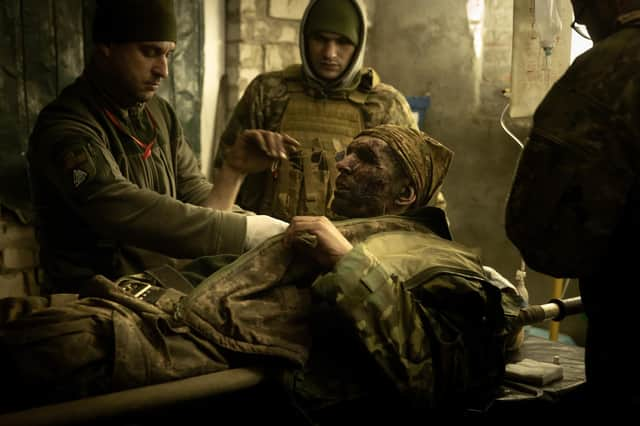On defence, SNP must avoid reflex to side against UK Government – Stewart McDonald MP


And yet here we are. Our Westminster group is under new leadership and I’m on the backbenches. Defence spokesperson is a peculiar job for an SNP MP. Even the most industrious nationalist would struggle to talk about Scottish independence as often as their counterparts beavering away on health or welfare policy and sometimes, like the months following the Ukraine invasion, I found myself working constructively with the government I was sent to Westminster to oppose. That doesn’t happen in many portfolios.
It’s also a unique brief for an SNP MP in that there is no immediately obvious counterpart in the Scottish Government. There is a Scottish Government minister working on veterans and one working on Ukraine but given that it’s a policy area theoretically reserved to the UK Government, there is no full-time defence minister.
Advertisement
Hide AdAdvertisement
Hide AdI say theoretically because we know that the UK constitution is more malleable that many pretend. Jack McConnell proved that when he set up Scotland’s international development fund despite international activities being explicitly reserved to the UK Parliament. Indeed, when the former First Minister consulted with his colleagues in Westminster about it, he was told that “there’s more than enough work to go round” and UK Government lawyers were tasked with finding legal space for the programmes to be established.
There is a lesson here for today’s Scottish Government: be as engaged on defence as Jack McConnell was on foreign affairs. Thirty years after the United Nations Security Council published its landmark statement that “non-military sources of instability in the economic, social, humanitarian and ecological fields have become threats to peace and security”, it is more obvious than ever that issues of peace and security cannot be left to the centre alone.
More and more democratic governments are realising that the broad and dynamic spectrum of threats that open societies face today cannot be the preserve of national governments, however one wishes to define them. A whole-of-society approach to security is a fast-growing norm amongst Nato countries and, in a UK context, that surely means a greater role for the Scottish Government and others.
In 2021, I outlined the threat that foreign disinformation poses in Scotland and offered some solutions for tackling it. Only one policy proposal was directed at the UK Government. The rest were to the Scottish Government and Scottish society more broadly – and all fell within the current devolution settlement. When we have a UK Government that can barely be trusted to keep the lights on, it’s surely obvious that defence, security, and resilience policy should be hardwired across public and private spheres.
One of the most rewarding parts of the role of defence spokesperson in Westminster is the chance to grapple with issues like this, but it also presents its challenges. There are other more sensitive issues, like the catastrophic withdrawal from Afghanistan, allegations of illegal extrajudicial killings by members of the UK Special Forces, and the abhorrent misogyny experienced by women in the UK Armed Forces, that matter deeply to people across Scotland – regardless of their feelings on the constitutional question.
Responding to the questions raised by these issues as SNP defence spokesperson sometimes felt like being a member of a modern-day Lewis and Clarke Expedition, ploughing through new territory and opening new ground for the party. The brief leaves no shortage of opportunities to move out of your political comfort zone.
As a party which has grown up intertwined with the anti-nuclear movement, SNP debates on defence have historically been marked by an almost monomaniacal focus on Trident. I’m glad that flame still burns within my party – but I’m also proud to have taken the party into other realms of the European defence debate, illustrated at a standing-room-only event on European security at our recent conference.
Indeed, even our youth wing, well known for its previous opposition to all things military, recently changed its policy to back Nato membership for an independent Scotland. It’s a small change but a notable one. Whilst the party voted for a pro-alliance policy ten years ago, we never really took the time to flesh out what Scotland in Nato meant. I spent my time trying to change that by engaging experts across the Euro-Atlantic defence community.
Advertisement
Hide AdAdvertisement
Hide AdDemystifying defence is also important if we are to ensure we are alive to the modern threats of today. Too often, policymakers in all parties back off when it comes to defence because it’s seen as overly complex, but it is just like any other policy area and needs our attention.
That’s why I was pleased to facilitate a range of workshops, panels and events to ensure my party could hear from world-class experts and practitioners. I established the first Westminster-Holyrood defence working group, ensuring colleagues in the Scottish Parliament could be engaged in a policy area that could easily pass them by. I hope that my friend Dave Doogan continues this approach as he takes up the role of defence spokesperson.
As a party of government that seeks Scottish statehood, we must always be an engaged, confident, and relevant voice in the Euro-Atlantic security debate. That means challenging ourselves, appreciating the nuances of world affairs and shunning the all-too-tempting reflex to side against the UK Government. The world is more complex than that, as this year has shown.
The defence posture to be outlined in upcoming Scottish Government papers on independence will be a critical sign that we have adapted our outlook to a vastly changed world. I’m confident we will see just that, and it’s been a privilege to play my part from the front. Although now on the backbenches, I’ve got a lot more still to say.
Stewart McDonald is SNP MP for Glasgow South
Comments
Want to join the conversation? Please or to comment on this article.